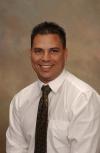1. What makes your program different from
other programs, or what made you choose your program?
I chose
ECU because my primary criteria for a program was one that would
make me an excellent clinician that could handle any patient
that came into my community ED, where I planned to practice.
ECU is somewhat unique in that there is an almost equal amount
of academic and private physicians that we as EM residents work
with. That provides a diverse experience in both working with
consultants as well as the patient population.
2. If not
answered above, what's the best aspect of your program?
The
diversity and acuity of the pathology.
3. Are there any
major upcoming changes to your program?
We
recently changed Chairmen (about 3 months ago). And we are
changing from 12 hours shifts to 9 hours shifts beginning July 1
2006.
4. Is there
anything you would change about your program if you could?
No.
5. How much are
you responsible for blood draws, putting in IVs, etc.?
We
only do blood draws or IVs if the nurses (after multiple
attempts) are unable to. We have very strong ancillary staff,
so we are freed from those duties, in order to concentrate on
the patient and the pathology.
6. Do you learn
mostly from attendings, other residents, or textbooks? Does this
vary when you do off-service rotations?
All
residents present directly to the attending. Most of our
learning is from the attendings, although, of course we learn
from each other as well as reading.
7. How does EMed
rank in your hospital's hierarchy?
Without bragging, we are at the top of the hierarchy. Our
program has been here for 25 years, and we are very well
respected by the hospital as well as the other departments.
8. What are the
perks that your school provides (PDAs, textbooks, conference
fees, meal tickets, etc.)?
We
get a PDA, a copy of Tintinalli, travel expenses to SAEM as PGY
2 and ACEP as PGY 3, meal allowance to cafeteria each month.
9. How do you
rate your rotations outside of the emergency department?
I
would say fair to good, with exception of Trauma, which is
excellent.
10. What's the
best elective you've done?
A
community ED elective.
11. How much
does your program focus on research?
It
is not a huge focus, in general. However, there are constantly
multiple projects and studies going on. We have two board
certified toxicologists that are frequently doing projects. We
also do a fair amount of bench research. Other research
interests are NEAR airway registry, public safety, domestic
violence. So, although research is not "shoved down our
throats" opportunities are numerous.
12. What do you
love and hate most about the city you're in?
Love - great size (certainly not a metropolis), and only about 1
1/2 hours from the beach.
Hate: the city is growing in population, and so the
infrastructure is lagging a bit.
13.
Please describe your typical month in terms of work hours and
days off.
As
of July 1, we will be doing 9 hour shifts (7-4, 3-12, 11-8) with
an hour of overlap to clean things up and not see new patients.
Also a 12 hour swing shift from 12-12. PGY 1 approx 23 shifts
per month. PGY 2 approx 21. PGY3 approx 19.
14.
How much time do you spend off-duty with the other residents?
Quite a bit. We are a pretty close knit group that has a lot of
fun together outside the ED.
15. Do you have
any international experience?
No.
16. What are your
plans after residency?
I
will be practicing in a private democratic group at a community
hospital that sees approx. 55k a year.
17. How prepared
do you feel?
Very.
18. Is there
anything you'd like to tell us that we haven't asked?
Of
course I am biased, but ECU rocks! Even though ECU is located
in a smaller city in rural NC, its catchment area, as the only
tertiary referral center and Level 1 Trauma center, is 29
counties and over 1.2 million people. So the pathology,
experience, number of procedures, and teaching are second to
none.
19. Do you have
any advice for current applicants, or is there anything you wish
you'd known when you were applying?
Do away rotations at places you think you may like to
train. It increases your odds of getting accepted, and it gives
you an opportunity to really get to know a program.
